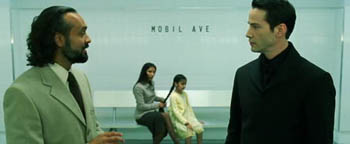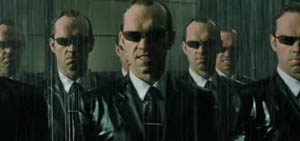|
This, I expect, is the Matrix film fans think of when recalling how the series went downhill. Personally, I found The Matrix Reloaded to be a definite improvement over the needlessly aggrandized original, but it was part two that made a part three necessary, and alas, this final chapter drops the ball; not just on the ground, but right down a sewer drain that likely leads to the earth's core. It is, frankly, a terrible mess. It's disjointed, meandering, and has the word "matrix" in its title for no other reason than force of habit, apparently. 
Somewhere in the netherworld between the last film and this one, Neo's mind got stuck inside some holding area in the Matrix, even though the end of Reloaded showed it getting dumped back into his body. The orchestrator of this poorly-explained plot point is the Merovingian, who has decided to keep Neo prisoner. After the first half-hour is up, Neo is out, and the incident is never mentioned again. Neither is the Merovingian. The whole affair is startlingly pointless. After this bit of meaningless dicking about, we rejoin the plot, which involves the machines preparing to launch their final attack of the human outpost Zion. Offscreen, the humans' fleet was defeated by the actions of the insidious Smith program, now downloaded into a human body, leaving only two ships left to save our species. It should be tense and gripping, and it fails to be so. The series has, at this point, given up on including anything akin to speculative ideas. On the one hand, many of its previous ideas were half-baked or outright wrong; on the other hand, ideas are usually better than an absence of ideas, which is what we're left with. Brief ponderings on existential vaguaries give way to pondering on what idiot designed the humans' combat power suits with open cockpits, or why the machines' squid contraptions don't just attack and kill everyone instead of flying around in easily-targetable clumps for most of the battle. 
Much of Revolutions' running time is given over to a panopoly of secondary characters, giving far too little to the ones we were at least theoretically supposed to be invested in. Neo and Trinity disappear for a protracted duration in the film's middle. Almost worse-no, make that actually worse; Neo and Trinity aren't that interesting-so does the Matrix itself. This film hardly features it. Aside from the fact that the Wachowski brothers passed up their last opportunity to explain why the Matrix even needed to exist in the first place, having the bulk of the film's conflict occur outside of it just seems to pound home its near-irrelevancy that much more. The potentially most interesting idea in the series, that of a virtual world that obeys slightly different rules than the real one, goes almost completely unexplored here. Reloaded started expanding on the idea; Revolutions really only bothers with new matrix-oriented notions in the maddeningly superfluous first half-hour, returning at the end for a flashier rehash of the original Matrix's final fight, and occasionally dropping by the Oracle's place so someone can again be told "You already know the answer" by what I must conclude is the most useless oracle in the history of fiction. Hell, I'd be satisfied if for once in one of these "man versus machine" stories, they'd bother to indicate just what the machines plan to do should they win, other than just sitting around being machines. Why do they actually have a city? Is it full of stores and office buildings with lots of little cubicle jobs like the one Neo used to have? What do these sentient programs have to live for, anyway? What's most disappointing with this final film is that, for all of its past pretensions of intellectualism, ultimately the story of The Matrix is philosophically a sham. It dabbles in questions of determinism and free will, but eventually just settles for serving up another helping of populist feel-good, fortune-cookie pandering about how great it is to have faith and believe (just count the number of times that word appears in the trilogy), as if abdicating reason in favor of a merely preferred worldview was something to be proud of. Way to blaze some new trails there, guys. I'm glad it took several hundred million bucks and six hours' worth of Keanu Reeves' acting to impart that lousy lesson yet again. -review by Matt Murray
|
|
||||||||